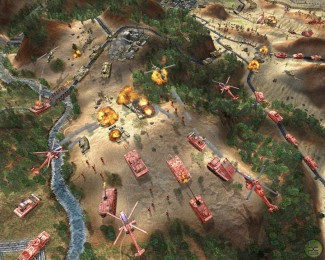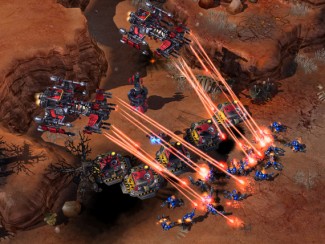A Dark Room
LQ: 9.05
Recommended Age: 10+
Skills Used: Focus, Planning, Mathematics, Reading
Recommended LWK Games: Advance Wars, Feildrunners, Kingdom Rush, League of Legends, Sid Meier’s Civilization V, Total War: Shogun II, StarCraft II: Wings of Liberty, Valkyria Chronicles
Popular M-Rated Games: XCOM: Enemy Unkown, Warhammer 40,000: Dawn of War II
Common Thinking Skills Used: Planning, Organization
Strategy games come in a variety of flavors, from turn-based tactical shooters like Valkyria Chronicles, to tower-defense titles such as Dungeon Defenders and real-time strategy games like Starcraft II: Wings of Liberty. While all these sub-sects of the genre employ unique gameplay mechanics that differentiate them from one another, they all are based around a focus on strategy and tactical planning. Some games use a very basic structure, tasking players with buying and placing troops via pre-sets amounts of money, while more advanced games will require players to manage a virtual economy, mining resources, training workers and building up funds organically in order to purchase goods. This focus on logistics makes strategy games a great way to get players flexing a range of Planning and Organization skills.
Want more games? Click here to view our complete list of strategy PlayBooks.
Developing a systematic approach for setting and achieving goals.
 To achieve victory in any strategy games, keen foresight and careful preparation are key. Deciding how best to earn and spend currency is a major factor in many strategy games, as players must weigh the benefits of various options before making purchases. Should defensive units be bought in an effort to ward off an upcoming attack, or would it be best to pump money into offensive attack troops for a counter-strike, in hopes of wiping out the enemy? Or perhaps money would be best spent on upgrading structure and training troops to up their defensive and attacking power. These are just some of the factors player must analyze when preparing for battle.
To achieve victory in any strategy games, keen foresight and careful preparation are key. Deciding how best to earn and spend currency is a major factor in many strategy games, as players must weigh the benefits of various options before making purchases. Should defensive units be bought in an effort to ward off an upcoming attack, or would it be best to pump money into offensive attack troops for a counter-strike, in hopes of wiping out the enemy? Or perhaps money would be best spent on upgrading structure and training troops to up their defensive and attacking power. These are just some of the factors player must analyze when preparing for battle.
Another major mechanic strategy games employ is the management of an in-game economy. Here, players must continually replenish resources and currency through mining ore, chopping down wood and gathering gold. Doing so ensures enough material is acquired to build up defensive and develop troops for battle, but if too much focus is spent on gathering such goods, the enemy may seize the opportunity to attack while during these inoffensive dormant moments. Balancing the gathering of goods with the construction of units and deployment of troops is key to success.
Arranging and coordinating materials in order to complete a task.
 Most games within the strategy genre — such as tower defense games and most RTS (real-time strategy) games — require players to arrange the placement of defensive units logically, in a manner which most effectively wards of upcoming attacks. Many games task players with building and maintaining a home base, while also constructing sub-bases across a wide and expansive map. Doing so enables players to create and move troops from crucial points in the map, requiring them to carefully consider how best to organize the construction of each base, arrange structures and defesive units, and decide which points in the map or most crucial to conquer.
Most games within the strategy genre — such as tower defense games and most RTS (real-time strategy) games — require players to arrange the placement of defensive units logically, in a manner which most effectively wards of upcoming attacks. Many games task players with building and maintaining a home base, while also constructing sub-bases across a wide and expansive map. Doing so enables players to create and move troops from crucial points in the map, requiring them to carefully consider how best to organize the construction of each base, arrange structures and defesive units, and decide which points in the map or most crucial to conquer.
For example, a large strore of gold and ore may sit in a mone to the western portion of the map. In order to gather resources from it, mining facilities must be contructed adjacent to the mine, while defensive units should be built around it for protection. If there is a narrow passage nearby which the enemy is likely to travel down during an attack, it would also be wise to flood that small area with offesive units, stopping the enemy before they have a chance to cripple the mining operation. Only by strategically arranging troops and structures about the map can players hope to coordinate a sound defense and powerful offense. Failure to organize such assets effective will almost always lead to defeat.
 Strategy games are one of the more cognitively demanding genres of video games that require the use of Planning and Organization skills, while also frequently demanding Time Management, Self-Awarenss and Flexibility. Think back to board games such as Risk or even Chess, in which strategic approaches are the keys to winning. This is the case for many popular video games such as Starcraft II, Sid Meier’s Civilization V, and Valkyria Chronicles. Strategy games are an excellent example of how video games encourage children to embrace challenging and difficult undertakings, with many gamers preferring these experiences over games that are simply fun or easy to beat.
Strategy games are one of the more cognitively demanding genres of video games that require the use of Planning and Organization skills, while also frequently demanding Time Management, Self-Awarenss and Flexibility. Think back to board games such as Risk or even Chess, in which strategic approaches are the keys to winning. This is the case for many popular video games such as Starcraft II, Sid Meier’s Civilization V, and Valkyria Chronicles. Strategy games are an excellent example of how video games encourage children to embrace challenging and difficult undertakings, with many gamers preferring these experiences over games that are simply fun or easy to beat.
Strategy games often employ dozens — if not hundreds — of gameplay factors, and present an incredible array of obstacles to success. Learning to understand and master such complexities is what many players find so rewarding about these games, and it is not uncommon to see children engage in a lengthy and thoughtful conversations about their gameplay strategies, weighing the effectiveness of their tactics and describing how and why they won or lost. This is because in order to reach victory, players must often refine their approach numerous times, a metacognitive skill that gets kids to “think about their own thinking.“
Fortunately, there are also a number of less complex strategy games that casual gamers can enjoy. Some of these games, such as Diner Dash and Squids, offer accessible fun for anyone, but still require that you use skills such as Flexibility, Planning and Time Management in order to succeed.
While many strategy games do not directly practice Self-Control skills, one interesting thought is that these types of games may get kids who tend to be impulsive and hyperactive to become somewhat more strategic and reflective in their thinking. The shorter, more casual games such as Feildrunners and Kingdom Rush may be some of the best games to introduce a child to becoming more thoughtful and contemplative in their most immediate actions, and offer a clear way of demonstrating the negative results of hasty or poor decision-making.
All membership plans come with full access to our entire suite of tools learning guides, and resources. Here are a few of the ones we think you’ll like the most: